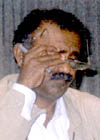
Constitutional Amendments, Opposition Stance [Archives:2000/49/Interview]
December 4 2000
After the majority of the parliament stood for the constitutional amendments many eyebrows are being raised about the next stance of the opposition. Will it mobilize its abilities to influence people’s choice for referendum? That was the question the Yemen Times addressed to a number of politicians below:

Mr. Abdullah
Al-Maqtari
Chairman of Nassirit Unionist Bloc
The constitutional amendments were forced although there were no real circumstances necessitating them. All justifications for them were not convincing and they don’t agree with the contents of the amended articles. The newly amended articles such as those of period of parliament, local authority and al-Shoura council include many negative points. Extension of the parliamentary period to 4 years will weaken the political interaction. Article (143) roots the principle of appointing governors instead of electing them. It is clear that the constitutional amendments have been made to agree with the law of local authority which was opposed by the opposition.
Although the al-Shoura Council is part of the Executive Authority, the amendments entitle it to share responsibilities and duties of the legislative authority embodied by the parliament. Agreements, treaties and issues related to war, peace, borders, etc. are now judged jointly by the parliament and the al-Shoura Council which means controlling all authorities by the executive authority.
The procedures taken to pass the amendments were unconstitutional. According to the standing order discussions of the amendments were supposed to commence 48 hours after the report of the amendment committee was presented. But discussions immediately followed reading it.

Dr. Mohammed
Al-Mekhlafi
Professor of International Law at Sanaa University
It was expected that the parliament would not be able to defend the constitution and the democratic margin guaranteed by the constitution because the parliament itself could not defend its authority and privileges of its members. This is mainly because it was the wish of the president who enjoys power and full support of members of his party.
In this view the opposition party did not address the parliament but the people and tried to convince the President to cancel his suggested draft.
We will use all peaceful manners and procedures to reject the amendments and convince people of supporting us.
I am sure that people will join us.

Mr. Abdul Bari Taher said
Former Chairman of Journalist Syndicate, and former member of the executive commity of the YSP
“I can not foresee what stance the opposition will adopt for the coming days.
Opposing the constitutional amendments is a national responsibility of all political parties, syndicates, societies, etc. They should exploit all legal methods to oppose them and urge upon people to boycott the referendum. They should bring to light the consequences of the amendments such as canceling the right of peaceful transference of power, entitling authorities to a specific council, exempt the state from providing free educational and health services.

Advocate Sultan
Al-Garadi
The position of opposition parties against the amendments have been confined to useless letters of condemnation. I am sure that they will fail to influence the public’s opinion. Even if they decide to boycott the referendum that will have no effects because they do not adopt modern political steps in their activities.
——
[archive-e:49-v:2000-y:2000-d:2000-12-04-p:./2000/iss49/intrview.htm]


